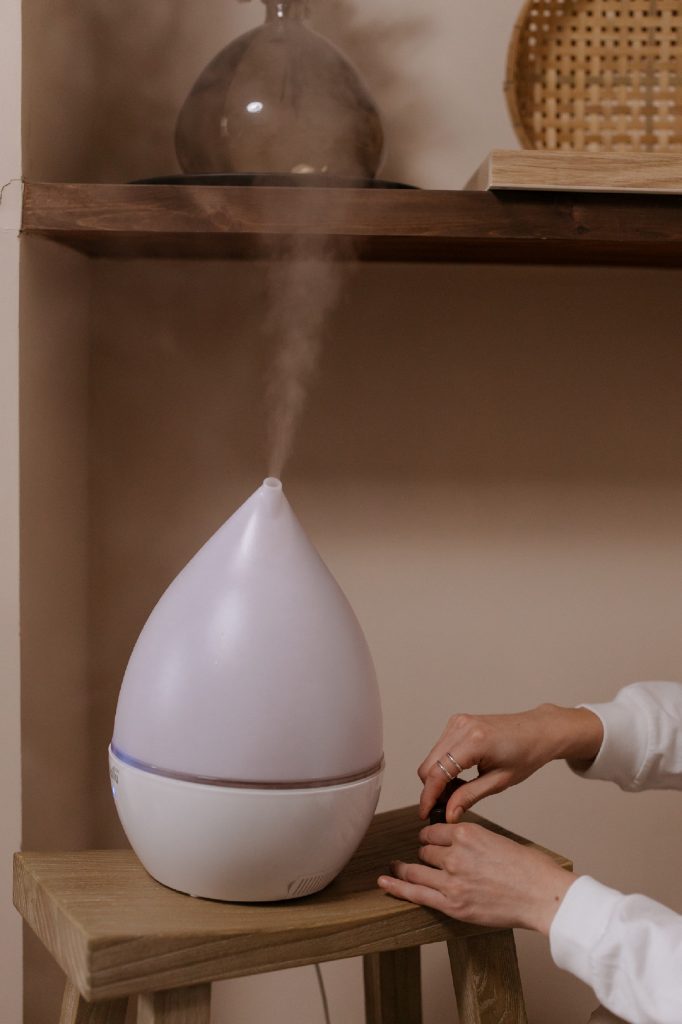Did you ever visit a humid place only to immediately wish you were anywhere else? If that is the case, you might not know the benefits of having humidified air. According to Mayo Clinic, issues such as dry sinuses, bloody nose, and cracked lips – all caused by indoor air – can be soothed by humidified air. If you live in a dry climate, you might want to get yourself a room humidifier to prevent breathing and other issues in your home.
As beneficial as a room humidifier is, however, remember that when used the wrong way, it can cause more harm than help. It can lead to the breeding of bacteria and mold. So, before purchasing one, get to know the features of different types of room humidifiers so you choose the one that perfectly meets your needs.
Now, Are You Wondering What A Room Humidifier Is?
After going through this article, you’ll know what a room humidifier is, the types of humidification, and the important factors you should consider when buying one.
Types of Room Humidifier
A room humidifier is an electrical appliance used to increase the room moisture or humidity. In the market, many types of room humidifiers are available, like:
01. Cool Mist:

These types of humidifiers are more effective in warm climates. They use wicks to disperse mist into the air as they have no heating element. The good thing about cool mist humidifiers is that they are easy to clean.
They’re the best choice for people suffering from emphysema and asthma as they make it easier to breathe. However, cool mist humidifiers also have a bad side- they’re noisy and have filters that have to be changed often to avoid a build-up of mold and algae.
02. Warm Mist:

These humidifiers work well in freshwater areas. Unlike cool mist humidifiers, warm mist humidifiers have a heating element that warms the water up to the boiling point. The water is then diffused into the air as a vapor.
Compared to the cool mist modifier, the warm mist humidifier is quieter and occupies a small space. They’re also great for treating issues like the flu and colds as they are effective in killing allergens and bacteria that cause allergic reactions.
Another positive about warm mist humidifiers is that most of them can be used for aromatherapy.- They come equipped with scent compartments that enable you to diffuse medicinal and herbal oils.
03. Ultrasonic Humidifiers:

Ultrasonic humidifiers have no heating element and use vibrating sound waves to disperse moisture into the air as a fine mist. They’re ideal for use in a bedroom overnight as they’re the quietest.
If you live in an area with hard mineral water and need ultrasonic humidifiers, it would be advisable to use filtered or demineralized water in the tank as there is a tendency for furniture to get coated with white powder.
Factors to Consider When Choosing A Room Humidifier

Do you want to purchase a room humidifier and wondering how to choose the best one? Here are five factors you should consider while choosing a room humidifier:
01. Environment:
When deciding which room humidifier to choose, the climate of the place where you live should dictate your choice. For example, if you live in a cold area, you should go for a warm mist humidifier as it emits a warm vapor that raises the room’s temperature, making you feel comfortable. With it, you would also save cash on heating bills.
On the other hand, if you dwell in a warmer environment, the cool mist variety would come in handy. It helps in reducing the room’s ambient temperature. Therefore, it’s highly recommended for bedrooms where cold air is highly preferred to warm air at night.
02. Noise:
The noise produced by a room humidifier depends on the speed you set. The fan on a low setting is whisper-quiet, but loud enough to disturb your sleep when on a high setting.
However, if you need a quieter place, opt for either an ultrasonic or warm mist humidifier, as they are the quietest among all the varieties because they don’t have a fan for blowing air into the air.
Although warm mist humidifiers make some sounds as it heats the water, it can’t distract you from what you’re doing. Also, before buying a humidifier, ask the seller how quiet it is and, if possible, test it yourself.
03. Capacity:
A room humidifier’s maximum coverage capacity should be the first factor to consider when choosing one, as it determines its ability to humidify your room. You should consider not only the capacity of the water tank but also its moisture output.
Medium-priced humidifiers can handle a room of roughly 250-500 square-feet and a large one can effectively cover a room of 3600 square-feet.
However, going for a room humidifier that is too large would be a bad idea. If the humidifier is too big for your room, condensation would appear on the windows’ sides. Also, it can lead to the growth of mildew and bacteria.
Therefore, it would be advisable to measure your room to determine the capacity of the room humidifier that would be appropriate for your room.
04. Budget:
A decent room humidifier would cost around $30 to $300. However, if money is not a problem, the sky is the limit as there are many room humidifiers in the market that would suit your budget.
If you’re looking for a humidifier to humidify a small room in your home, you can look at the lower end of your budget. If you want to install a furnace humidifier that would impact your indoor air, however, ensure that you have a ‘fat’ budget as they’re costly.
05. Health and Safety Features:
Most room humidifier models have built-in safety features where the unit automatically shuts off whenever the water reservoir is empty. It is a must-have feature in a room humidifier.
It is advisable to look for humidifiers with a built-in hygrometer that automatically shuts off when the air humidity required is reached. This prevents the air from over-saturating as it would encourage the growth of molds.
There are also cool mist humidifiers with UV light features that kill the bacteria in water and have reservoirs for aromatic oils, which allow them to offer aromatherapy. So, if you need this type of room humidifier, take your time to ensure that you buy one with all the features you want.
Now that you have all the information you need about room humidifiers, consider the features available in the different models and choosing a room humidifier that provides you with significant features. However, be careful not to purchase a humidifier with lots of costly bells and whistles that are not very useful.
Most of your time is spent inside the house, so paying attention to the indoor air quality while you’re there is essential. Bringing essential changes in lifestyle can help you to improve indoor air quality to a greater extent.
To know how to do it, go here –
How to Improve the Air Quality Inside Your House?
Image Courtesy: Image 3
Author Bio
Jennifer Kiminza – Jennifer Kiminza is a content writer and content marketing professional at Hub Spot, an inbound marketing and sales platform that helps companies attract visitors, convert leads, and close customers. Previously, Jennifer worked as a marketing manager for a tech software startup. She graduated with honors from Nairobi University with a dual degree in Business Administration and Creative Writing.


